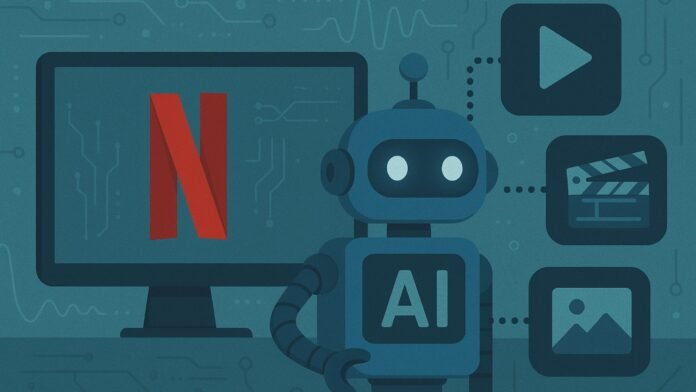Netflix’s AI Evolution: How Generative AI is Reshaping Entertainment Production and Experience
Netflix, the streaming titan that redefined how the world consumes entertainment, is now at the vanguard of another seismic shift: the integration of generative AI. Far from merely a buzzword, generative artificial intelligence is rapidly becoming a core component of Netflix’s strategy, impacting everything from the rapid creation of visual effects to highly personalized viewer experiences and innovative advertising models. This strategic embrace of AI, championed by co-CEOs Ted Sarandos and Greg Peters, signals a profound transformation in content creation and audience engagement within the entertainment industry.
The company’s recent Q2 2025 earnings call highlighted a significant milestone: the Argentine sci-fi series El Eternauta featured the “first GenAI final footage to appear on screen” in a Netflix original. This groundbreaking sequence, depicting a collapsing building, was produced an astonishing ten times faster and at a fraction of the cost of traditional visual effects. This is not just about efficiency; it’s about unlocking creative possibilities previously constrained by budget and time, making ambitious storytelling accessible to a wider range of productions.
The Visionaries at the Helm: Sarandos and Peters on AI
Under the leadership of Ted Sarandos and Greg Peters, Netflix’s approach to generative AI is nuanced and strategic. They view AI not as a replacement for human creativity but as a powerful tool that augments and enhances the work of creators.
Ted Sarandos, co-CEO, emphasized this during the Q2 earnings call, stating, “We remain convinced that AI represents an incredible opportunity to help creators make films and series better, not just cheaper.” He highlighted how AI tools are already improving pre-visualization, shot planning, and advanced visual effects like de-aging—techniques once exclusively reserved for blockbusters with massive budgets. This democratization of high-end production capabilities empowers filmmakers to realize their visions with unprecedented efficiency.
Greg Peters, also co-CEO, expanded on AI’s broader impact beyond content creation, noting its deployment in core platform features such as personalization, search, and advertising systems. Netflix’s ambition extends to launching interactive, AI-driven ads in late 2025, further enhancing user engagement and monetization on its burgeoning ad-supported tier.
Beyond VFX: Generative AI’s Multi-Faceted Role at Netflix
Netflix’s generative AI strategy is comprehensive, touching various facets of its operations:
- Accelerated Content Production: The most direct and visible application of generative AI is in visual effects (VFX). The El Eternauta example demonstrates how complex scenes can be rendered with remarkable speed and cost-effectiveness. This capability is poised to democratize sophisticated visual storytelling, allowing more diverse and globally relevant productions to achieve cinematic quality. It enables creative teams to iterate faster, experiment more, and bring highly imaginative concepts to life.
- Hyper-Personalized User Experience: Netflix has long been a pioneer in personalization through its recommendation algorithms. Generative AI is taking this to the next level. The company is trialing a new AI-powered search experience, allowing users to discover content using natural, conversational language. Imagine asking, “Show me a dark psychological thriller from the 80s” and getting spot-on recommendations. AI is also being used to localize title cards and promotional materials, making content resonate more effectively with audiences across different languages and cultures.
- Innovative Advertising: With its ad-supported plan growing, Netflix is leveraging generative AI to create contextually relevant and personalized ads. These AI-enhanced ads might appear during pauses or mid-roll, seamlessly blending with the aesthetic of the show being watched. This dynamic product placement and creative ad generation reduce friction for advertisers and enhance the viewing experience, moving away from generic, disruptive commercials.
- Operational Efficiency: Beyond the viewer-facing applications, generative AI is streamlining internal workflows. From script analysis to talent management, permitting, and planning, AI tools are enhancing efficiency, allowing human teams to focus on higher-value creative and strategic tasks. This operational optimization translates into faster production cycles and better resource allocation.
The Road Ahead: Opportunities and Challenges
Netflix’s bold foray into generative AI positions it as a leader in the entertainment tech space. The global generative AI in media and entertainment market is projected for significant growth, with opportunities arising in areas like text-to-image generation and cloud-based solutions. Netflix’s incremental yet impactful adoption of AI serves as a blueprint for large organizations looking to innovate while maintaining quality and creative integrity.
However, the path is not without its complexities. The broader entertainment industry has expressed concerns about intellectual property rights and potential job displacement, evidenced by the 2023 Hollywood strikes that led to new guidelines for AI use. Netflix’s leadership maintains that AI is a tool for empowerment rather than replacement, but ongoing dialogue and transparent implementation will be crucial to addressing these industry-wide anxieties.
For startup founders in the entertainment and tech sectors, Netflix’s strategy offers invaluable lessons:
- Embrace Augmentation, Not Replacement: View AI as a powerful co-pilot that enhances human capabilities, not a substitute for human creativity.
- Focus on Specific Pain Points: Identify areas where AI can deliver tangible improvements in efficiency, cost, or creative output, like VFX or personalized discovery.
- Strategic Integration: Don’t just dabble; integrate AI deeply into core operations and product offerings to create a holistic and transformative impact.
- Prioritize User Experience: Leverage AI to make your product or service more intuitive, personalized, and engaging for the end-user.
- Navigate Ethical Considerations: Be proactive in addressing concerns around intellectual property, job impact, and ethical AI development to build trust and ensure sustainable growth.
Netflix’s journey with generative AI is still in its early chapters, but the initial results and strategic direction are clear. By harnessing the power of AI to make content creation faster and more accessible, and by personalizing every touchpoint with the viewer, Netflix is not just adapting to the future of entertainment; it’s actively shaping it.
Are you a startup founder or innovator with a story to tell? We want to hear from you! Submit Your Startup to be featured on Taalk.com.








